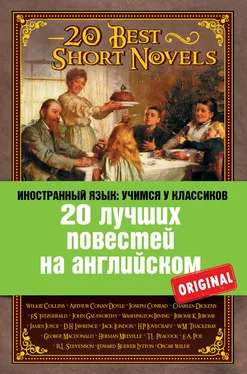I left the room. Half an hour later I started for Mr. Beldheimer’s house; leaving the arrangements for the morning of the first of March in the hands of the doctor and my wife.
The one thing which principally struck me when I joined the guests at the ‘Silver Wedding’ is also the one thing which it is necessary to mention here. On this joyful occasion a noticeable lady present was out of spirits. That lady was no other than the heroine of the festival, the mistress of the house!
In the course of the evening I spoke to Mr. Beldheimer’s eldest son on the subject of his mother. As an old friend of the family, I had a claim on his confidence which the young man willingly recognized.
‘We have had a very disagreeable matter to deal with,’ he said; ‘and my mother has not recovered the painful impression left on her mind. Many years since, when my sisters were children, we had an English governess in the house. She left us, as we then understood, to be married. We heard no more of her until a week or ten days since, when my mother received a letter, in which our ex-governess described herself as being in a condition of great poverty and distress. After much hesitation she had ventured – at the suggestion of a lady who had been kind to her – to write to her former employers, and to appeal to their remembrance of old times. You know my mother: she is not only the most kind-hearted, but the most innocent of women – it is impossible to persuade her of the wickedness that there is in the world. She replied by return of post, inviting the governess to come here and see her, and inclosing the money for her traveling expenses. When my father came home, and heard what had been done, he wrote at once to his agent in London to make inquiries, inclosing the address on the governess’ letter. Before he could receive the agent’s reply the governess, arrived. She produced the worst possible impression on his mind. The agent’s letter, arriving a few days later, confirmed his suspicions. Since we had lost sight of her, the woman had led a most disreputable life. My father spoke to her privately: he offered – on condition of her leaving the house – a sum of money to take her back to England. If she refused, the alternative would be an appeal to the authorities and a public scandal. She accepted the money, and left the house. On her way back to England she appears to have stopped at Metz. You will understand what sort of woman she is when I tell you that she was seen the other day in a tavern, with your handsome groom, Joseph Rigobert.’
While my informant was relating these circumstances, my memory was at work. I recalled what Francis Raven had vaguely told us of his wife’s experience in former days as governess in a German family. A suspicion of the truth suddenly flashed across my mind. ‘What was the woman’s name?’ I asked.
Mr. Beldheimer’s son answered: ‘Alicia Warlock.’
I had but one idea when I heard that reply – to get back to my house without a moment’s needless delay. It was then ten o’clock at night – the last train to Metz had left long since. I arranged with my young friend – after duly informing him of the circumstances – that I should go by the first train in the morning, instead of staying to breakfast with the other guests who slept in the house.
At intervals during the night I wondered uneasily how things were going on at Maison Rouge. Again and again the same question occurred to me, on my journey home in the early morning – the morning of the first of March. As the event proved, but one person in my house knew what really happened at the stables on Francis Raven’s birthday. Let Joseph Rigobert take my place as narrator, and tell the story of the end to You – as he told it, in times past, to his lawyer and to Me.
The Fourth Narrative
Statement of Joseph Rigobert: addressed to the advocate who defended him at his trial
Respected Sir, – On the twenty-seventh of February I was sent, on business connected with the stables at Maison Rouge, to the city of Metz. On the public promenade I met a magnificent woman. Complexion, blond. Nationality, English. We mutually admired each other; we fell into conversation. (She spoke French perfectly – with the English accent.) I offered refreshment; my proposal was accepted. We had a long and interesting interview – we discovered that we were made for each other. So far, who is to blame?
Is it my fault that I am a handsome man – universally agreeable as such to the fair sex? Is it a criminal offense to be accessible to the amiable weakness of love? I ask again, who is to blame? Clearly, nature. Not the beautiful lady – not my humble self.
To resume. The most hard-hearted person living will understand that two beings made for each other could not possibly part without an appointment to meet again.
I made arrangements for the accommodation of the lady in the village near Maison Rouge. She consented to honor me with her company at supper, in my apartment at the stables, on the night of the twenty-ninth. The time fixed on was the time when the other servants were accustomed to retire – eleven o’clock.
Among the grooms attached to the stables was an Englishman, laid up with a broken leg. His name was Francis. His manners were repulsive; he was ignorant of the French language. In the kitchen he went by the nickname of the ‘English Bear.’ Strange to say, he was a great favorite with my master and my mistress. They even humored certain superstitious terrors to which this repulsive person was subject – terrors into the nature of which I, as an advanced freethinker, never thought it worth my while to inquire.
On the evening of the twenty-eighth the Englishman, being a prey to the terrors which I have mentioned, requested that one of his fellow servants might sit up with him for that night only. The wish that he expressed was backed by Mr. Fairbank’s authority. Having already incurred my master’s displeasure – in what way, a proper sense of my own dignity forbids me to relate – I volunteered to watch by the bedside of the English Bear. My object was to satisfy Mr. Fairbank that I bore no malice, on my side, after what had occurred between us. The wretched Englishman passed a night of delirium [52]. Not understanding his barbarous language, I could only gather from his gesture that he was in deadly fear of some fancied apparition at his bedside. From time to time, when this madman disturbed my slumbers, I quieted him by swearing at him. This is the shortest and best way of dealing with persons in his condition.
On the morning of the twenty-ninth, Mr. Fairbank left us on a journey. Later in the day, to my unspeakable disgust, I found that I had not done with the Englishman yet. In Mr. Fairbank’s absence, Mrs. Fairbank took an incomprehensible interest in the question of my delirious fellow servant’s repose at night. Again, one or the other of us was to watch at his bedside, and report it, if anything happened. Expecting my fair friend to supper, it was necessary to make sure that the other servants at the stables would be safe in their beds that night. Accordingly, I volunteered once more to be the man who kept watch. Mrs. Fairbank complimented me on my humanity. I possess great command over my feelings. I accepted the compliment without a blush.
Twice, after nightfall, my mistress and the doctor (the last staying in the house in Mr. Fairbank’s absence) came to make inquiries. Once before the arrival of my fair friend – and once after. On the second occasion (my apartment being next door to the Englishman’s) I was obliged to hide my charming guest in the harness room. She consented, with angelic resignation, to immolate her dignity to the servile necessities of my position. A more amiable woman (so far) I never met with!
Читать дальше
Конец ознакомительного отрывка
Купить книгу












